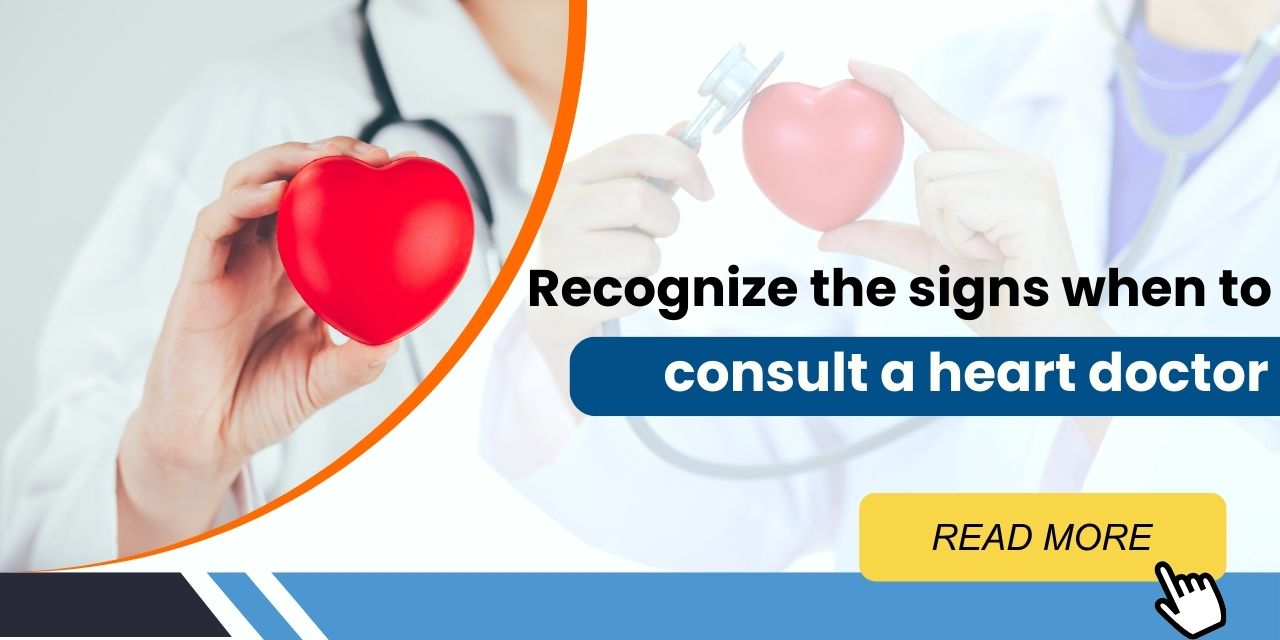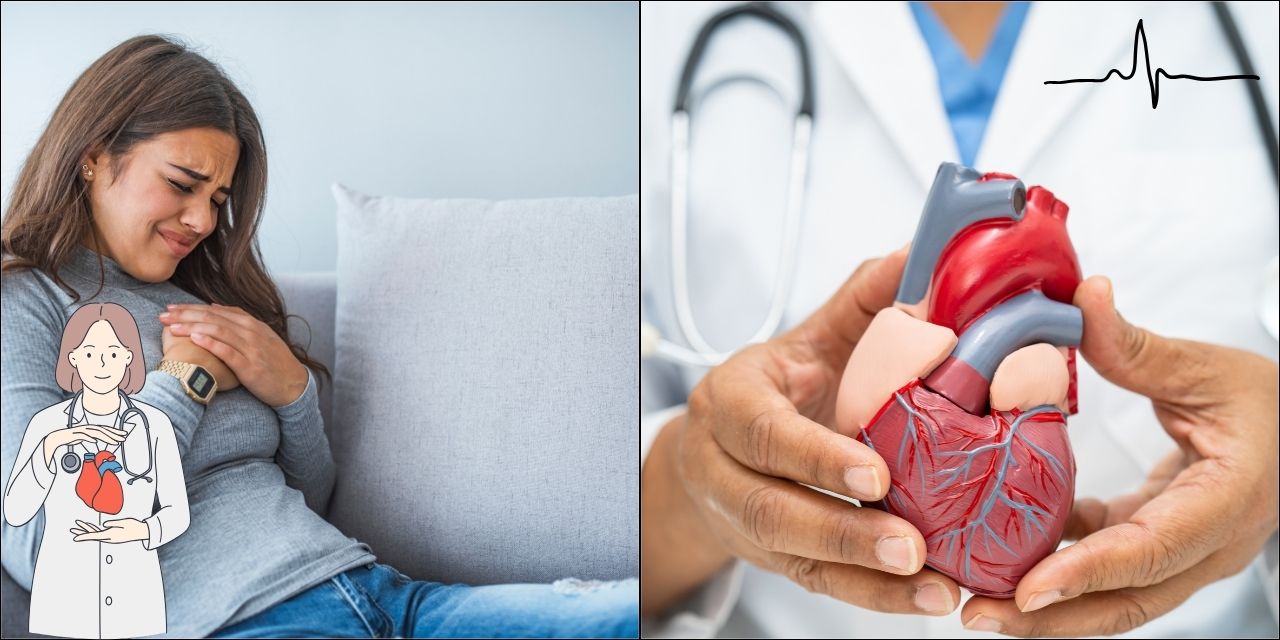Our heart is a vital organ that keeps us alive by pumping blood throughout our body. Recognizing the signs of heart problems that indicate you need to consult a heart doctor can be life-saving. Here are some key symptoms that should prompt you to seek medical attention:
👉 Chest Pain or Discomfort
Chest pain or discomfort is one of the most common signs of heart problems. It can feel like pressure, squeezing, fullness, or pain in the chest. This symptom often indicates a blocked artery or a heart attack. If you experience persistent or severe chest pain, it is crucial to consult a heart doctor immediately.
👉 Shortness of Breath
If you find it difficult to breathe, especially during routine activities or while lying down, it could be a sign of heart disease. Shortness of breath can indicate heart failure or other cardiac conditions that need prompt medical evaluation.
👉 Fatigue and Weakness
Unexplained fatigue and weakness, especially if they are sudden or severe, can be a symptom of heart disease. If you feel excessively tired despite adequate rest, it is important to see a heart doctor.
👉 Irregular Heartbeat
An irregular heartbeat, or arrhythmia, can feel like a fluttering or pounding in the chest. While some arrhythmias are harmless, others can lead to serious complications. If you experience palpitations or an irregular heartbeat, consult a heart doctor for an evaluation.
👉 Swelling in Legs, Ankles, or Feet
Swelling in the lower extremities can be a sign of heart failure, as it indicates that the heart is not pumping blood effectively. If you notice persistent swelling in your legs, ankles, or feet, seek medical advice.
👉 Dizziness or Lightheadedness
Feeling dizzy or lightheaded can be a sign of a heart condition, especially if it occurs frequently or is accompanied by other symptoms like chest pain or shortness of breath. It is important to consult a heart doctor to determine the cause.
👉 Persistent Cough or Wheezing
A chronic cough or wheezing, especially if it produces pink or white mucus, can be a sign of heart problems. This symptom occurs because fluid builds up in the lungs when the heart is not functioning properly.
Self Care for Heart Health
Taking care of your heart is essential for maintaining overall health and preventing heart disease. Here are some self-care tips to keep your heart healthy:
1. Eat a Heart-Healthy Diet
A balanced diet rich in fruits, vegetables, whole grains, lean proteins, and healthy fats can significantly reduce the risk of heart disease. Limit your intake of saturated fats, trans fats, cholesterol, and sodium.
2. Exercise Regularly
Regular physical activity helps strengthen the heart, improve circulation, and maintain a healthy weight. Aim for at least 30 minutes of moderate-intensity exercise most days of the week.
3. Manage Stress
Chronic stress can negatively impact heart health. Practice stress management techniques such as meditation, yoga, deep breathing exercises, or hobbies that you enjoy.
4. Avoid Smoking and Limit Alcohol
Smoking is a major risk factor for heart disease. If you smoke, seek help to quit. Additionally, limit alcohol consumption to moderate levels to protect your heart.
5. Monitor Blood Pressure and Cholesterol
Regularly check your blood pressure and cholesterol levels. High blood pressure and high cholesterol can increase the risk of heart disease. Follow your doctor’s recommendations for maintaining healthy levels.
6. Maintain a Healthy Weight
Being overweight or obese increases the risk of heart disease. Adopt a healthy eating plan and regular exercise routine to achieve and maintain a healthy weight.
7. Get Regular Check-Ups
Regular check-ups with your healthcare provider can help detect heart problems early and manage risk factors effectively. Discuss any symptoms or concerns with your doctor.
Frequently Asked Questions
➤ What are the common symptoms of heart disease?
Common symptoms include chest pain, shortness of breath, fatigue, irregular heartbeat, swelling in the legs, dizziness, and persistent cough.
➤ How can I improve my heart health?
You can improve your heart health by eating a balanced diet, exercising regularly, managing stress, avoiding smoking, limiting alcohol, monitoring blood pressure and cholesterol, maintaining a healthy weight, and getting regular check-ups.
➤ When should I see a heart doctor?
You should see a heart doctor if you experience any symptoms of heart disease, such as chest pain, shortness of breath, fatigue, irregular heartbeat, swelling, dizziness, or persistent cough.
➤ What is the best diet for heart health?
A heart-healthy diet includes plenty of fruits, vegetables, whole grains, lean proteins, and healthy fats while limiting saturated fats, trans fats, cholesterol, and sodium.
➤ How often should I get my heart checked?
It is recommended to have regular check-ups with your healthcare provider to monitor your heart health, especially if you have risk factors for heart disease. Your doctor can advise on the appropriate frequency based on your individual health needs.
For expert care, consider visiting ACE Heart & Vascular Institute and consulting with Dr. Puneet Verma for a comprehensive evaluation and personalized treatment plan.
Conclusion
Recognizing the signs that you need to consult a heart doctor and adopting self-care practices can significantly improve your heart health and prevent serious complications. If you experience symptoms like chest pain, shortness of breath, fatigue, irregular heartbeat, swelling, dizziness, or persistent cough, it is essential to seek medical attention.
For more information and to schedule a consultation with Dr. puneet verma , visit ACE Heart & Vascular Institute, offering top-notch heart treatment in Mohali with the best heart doctors in the region.For more inquiries please contact us on +919041386868












